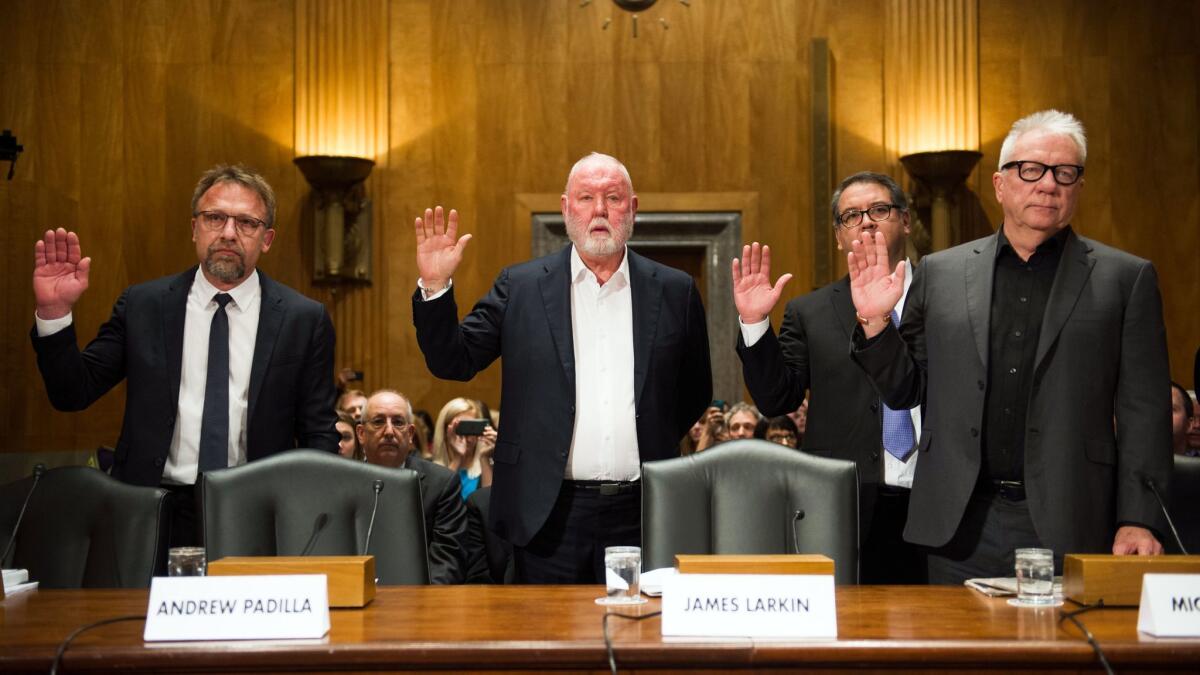Their clout diminished, Silicon Valley firms abandon fight over sex-trafficking bill

- Share via
Reporting from Washington — Battered from attacks by lawmakers and the public over the criminal activity taking place on their platforms, large internet companies have stopped fighting a push in Congress to combat online sex trafficking by holding them more accountable for the content on their sites.
The abrupt turnabout by the trade association representing such firms as Google, Facebook and Amazon enabled senators backed by victims’ rights advocates and almost every state attorney general on Wednesday to advance a measure limiting the legal immunity of websites where trafficking is promoted.
The Commerce Committee’s unanimous passage of the Stop Enabling Sex Traffickers Act signaled a weakening of Silicon Valley’s political clout as politicians lose patience with the reluctance of some tech companies to more aggressively help victims and law enforcement. The measure’s advancement comes as firms face withering attacks on Capitol Hill for the platforms they unwittingly provided to Russian operatives seeking to influence American elections.
Online sex trafficking has likewise become a public relations problem for the firms. Lawmakers bristled at their refusal to consider stripping some of the immunity protections offered by the two-decade old Communication Decency Act, which have allowed websites, such as Backpage.com, to profit off of the illegal behavior of their posters. Judges have pointed to that immunity in dismissing claims by victims against such sites — sometimes in the face of what judges have acknowledged may be compelling evidence that the firms condoned trafficking.
“This is a momentous day in our fight to hold online sex traffickers accountable and help give trafficking survivors the justice they deserve,” said Sen. Rob Portman (R-Ohio), a sponsor of the bipartisan bill. After the Internet Assn. dropped its opposition to the bill late last week, the number of co-sponsors on the measure has grown to 44. Among those who have joined in support are both of California’s senators, who had previously avoided taking a position as the tech companies they represent fought the bill.
The swift passage of the measure through committee set off a backlash in Silicon Valley, where some other influential players accused the Internet Assn. of betraying the values of a free and open internet.
The Electronic Frontier Foundation warned the measure would be “disastrous to free speech and online communities.” In a blog post, it accused big tech companies of embracing censorship and selling out small startups who won’t be able to afford to defend themselves against the wave of litigation the measure would invite. The foundation and other critics warn the measure would be ineffective at fighting trafficking and push online companies to block and filter out postings that have nothing to do with illegal activity as a precaution.
Some in Congress are heeding such warnings. Sen. Ron Wyden (D-Ore.) on Wednesday immediately put a legislative “hold” on the bill, delaying its movement to the floor.
“Having written several laws to combat sex trafficking, I take a backseat to no one on the urgency of fighting this horrendous crime,” Wyden said in a statement. “However, I continue to be deeply troubled that this bill’s approach will make it harder to catch dangerous criminals, that it will favor big tech companies at the expense of startups and that it will stifle innovation.”
Critics of the measure warn companies could ease up on efforts to find and block traffickers because knowledge of that activity could heighten their exposure to liability. The bill’s proponents say the latest revisions were tailored to protect firms that are aggressively policing their sites from such lawsuits.
The big internet companies ultimately gave in, said Eric Goldman, co-director of the High Tech Law Institute at Santa Clara University, because the fight had become too damaging. “It was hurting the internet community’s overall perception inside the Beltway,” he said.
Some longtime foes of big internet companies celebrated their defeat.
“This is a big chink in Silicon Valley’s armor,” said Jaime Court, president of the California-based advocacy group Consumer Watchdog. “It will lead to more scrutiny of other ways Facebook and Google and Amazon are complicit in what amounts to criminal activity. The companies are going to have to police their platforms better if they don’t want Congress to take more action.”
Twitter: @evanhalper
More to Read
Get the L.A. Times Politics newsletter
Deeply reported insights into legislation, politics and policy from Sacramento, Washington and beyond. In your inbox twice per week.
You may occasionally receive promotional content from the Los Angeles Times.











